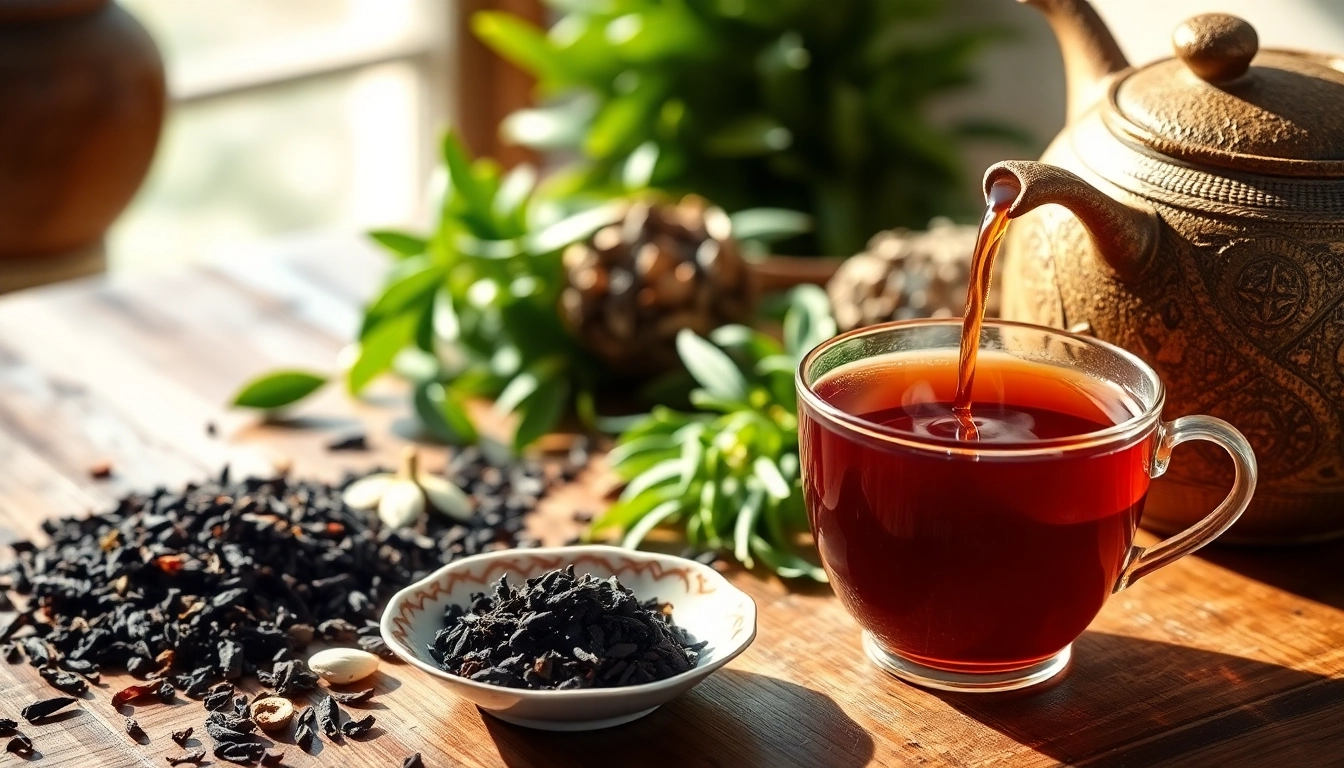Understanding Loose Leaf Black Tea
What is Loose Leaf Black Tea?
Loose leaf black tea is a premium form of tea that utilizes whole tea leaves rather than the crushed or dust-like particles often found in tea bags. This method allows for a richer flavor profile, as the larger leaves unfurl during brewing, releasing a full array of essential oils and compounds. The loose leaf format is celebrated not only for its superior taste but also for the health benefits associated with its antioxidant-rich properties.
Health Benefits of Loose Leaf Black Tea
Loose leaf black tea is not merely a flavorful beverage—it’s also packed with health benefits. Rich in polyphenols and flavonoids, this type of tea promotes cardiovascular health, supports healthy digestion, and aids in weight management. Furthermore, studies suggest that black tea can help reduce stress levels due to its calming effects, facilitating a moment of tranquility in our busy lives. Regular consumption of black tea can lead to improved cognitive functions, keeping your mind sharp and focused throughout the day.
Key Varieties of Loose Leaf Black Tea
There are several prominent varieties of loose leaf black tea, each offering distinctive flavors and aromas. Among these, the most notable include:
- Assam: Grown in India, Assam tea is known for its robust flavor and malty notes, making it a popular choice for breakfast blends.
- Darjeeling: Often referred to as the “Champagne of teas,” this Indian tea possesses a floral aroma and a delicate taste, enjoyed both hot and iced.
- Ceylon: Hailing from Sri Lanka, Ceylon tea has a bright flavor and a refreshing quality, making it perfect for iced teas.
- Keemun: A Chinese tea known for its smoky taste and fruity undertones, often associated with a higher caffeine content.
- Earl Grey: A flavored black tea infused with bergamot oil, renowned for its unique citrusy zing.
Choosing the Right Loose Leaf Black Tea
Factors to Consider When Buying
When selecting the perfect loose leaf black tea, consider these crucial factors:
- Quality of Leaves: Always opt for high-quality, whole leaves. Loose leaf black tea should look vibrant and fresh, without broken bits.
- Aroma: Smell the tea before purchasing. The aroma should be rich and inviting, hinting at the flavors.
- Origin: Different regions produce unique flavors. Familiarize yourself with teas from various areas to find your preferred profile.
- Altitude: Teas grown at higher altitudes often have complex flavors and greater aromatic qualities.
- Organic Certification: Consider organic teas to avoid chemicals and pesticides and to enjoy a cleaner brew.
Where to Find Quality Loose Leaf Black Tea
Finding quality loose leaf black tea can be achieved through various sources. Specialty tea shops often carry an extensive selection, allowing you to sample different varieties. Online retailers, including Loose leaf black tea merchants, provide the convenience of shopping from home with access to global selections. Don’t overlook local markets or health food stores that may stock unique blends as well.
Comparing Loose Leaf and Bagged Tea
The debate between loose leaf and bagged tea continues among tea enthusiasts. Loose leaf tea typically offers superior flavor and quality due to its larger leaves, which have more surface area for steeping, while bagged teas may contain lower-quality dust or fannings. Moreover, the steeping process for loose tea allows for greater control over brewing, enabling tea drinkers to adjust strength and flavor according to personal preference. Ultimately, personal taste and convenience will dictate your choice.
Brewing Techniques for Loose Leaf Black Tea
Equipment Needed for Best Results
To brew loose leaf black tea effectively, you will need the following equipment:
- Teapot or Gaiwan: These vessels allow for proper steeping and may enhance the tea’s flavor.
- Infuser or Tea Strainer: An infuser can help keep loose leaves contained while allowing water to circulate.
- Kettle: A quality kettle with temperature control ensures water is heated to the optimal temperature for black tea.
- Measuring Spoon: Accurate measurements of leaves are essential to achieving the perfect cup.
- Timer: Timing is crucial to avoid over-brewing, which can lead to bitterness.
Step-by-Step Brewing Instructions
- Start by measuring 1 teaspoon of loose leaf tea for every cup (about 8 oz) of water you plan to brew.
- Heat fresh, filtered water to a boiling point (around 200°F or 93°C for black tea).
- Place the leaves into the infuser or teapot, and pour the hot water over them.
- Cover and steep for 3 to 5 minutes, depending on your taste preference.
- Remove the infuser or strain the tea into your cup, and enjoy your freshly brewed beverage.
Tips for Perfecting Your Brew
To heighten your tea experience, keep these tips in mind:
- Experiment with Steeping Times: Adjust steeping times based on your personal taste. Shorter steeps yield delicate flavors, while longer steeps produce stronger brews.
- Water Quality: Use filtered water to eliminate any impurities that may affect the taste of your tea.
- Preheat Your Teapot: Swirling hot water in your teapot before brewing keeps your tea at an optimal temperature throughout the steeping process.
- Taste Test: Brew small amounts at varying times to find your ideal steep.
Pairing Loose Leaf Black Tea with Foods
Best Food Pairings for Black Tea
Pairing food with loose leaf black tea can enhance both the dining and tea experience. Here are some popular pairings:
- Breakfast Foods: Strong teas like Assam complement hearty breakfasts, including eggs, bacon, and oatmeal.
- Pastries: Darjeeling pairs beautifully with pastries and scones, offering a contrast to sweetness.
- Spicy Dishes: Ceylon tea’s brightness goes well with spicy food, helping to balance flavors.
- Savory Snacks: Pair Keemun with savory appetizers, as its smokiness enhances rich flavors.
Creating Tea-Inspired Recipes
Loose leaf black tea can be a wonderful ingredient in various recipes, including:
- Tea-Infused Risotto: Incorporate brewed black tea instead of stock for a unique twist.
- Tea-Glazed Carrots: Add brewed black tea to braised carrots for a sweet and earthy flavor.
- Tea-Infused Baked Goods: Add crushed leaves into cake or muffin batters for a distinct aroma and taste.
Enhancing Flavors with Herbs and Spices
For a personalized touch, consider enhancing your loose leaf black tea with herbs and spices. Fresh mint, ginger, cardamom, or cinnamon can elevate the flavor profile. Experiment with combinations to discover your favorite blends:
- Add freshly grated ginger to Assam for a warming beverage.
- Mix Earl Grey with a hint of vanilla for a creamy, aromatic experience.
- Combine crushed cardamom pods with Darjeeling for an exotic flair.
The Future of Loose Leaf Black Tea
Sustainable Practices in Tea Production
The future of tea production is leaning towards sustainability, as consumers become more aware of environmental impacts. Farms focused on organic methods reduce chemical usage and promote biodiversity. Many companies are investing in sustainable packaging to minimize waste, ensuring that the beauty of black tea can be appreciated by generations to come.
The Rise of Organic Loose Leaf Black Tea
With a growing demand for organic products, organic loose leaf black tea is rapidly gaining popularity. These teas are cultivated without pesticides or artificial fertilizers, which not only benefits consumer health but also supports the environment. Many producers are transitioning to organic farming methods, recognizing the need to meet consumer demand while promoting sustainable practices.
Trends to Watch in the Tea Industry
The tea industry is continuously evolving, and several trends are emerging that may redefine our approach to loose leaf black tea:
- Health and Wellness: With a surge in interest around functional beverages, teas with health benefits—such as anti-inflammatory properties or digestive enhancements—are becoming increasingly sought after.
- Flavored Teas: Innovative flavor blends and infusions are attracting younger consumers, with companies creating unique mixes that cater to diverse palates.
- Online Retail Expansion: The growth of e-commerce is revolutionizing the tea market, making it easier for consumers to access a wider range of loose leaf options.



